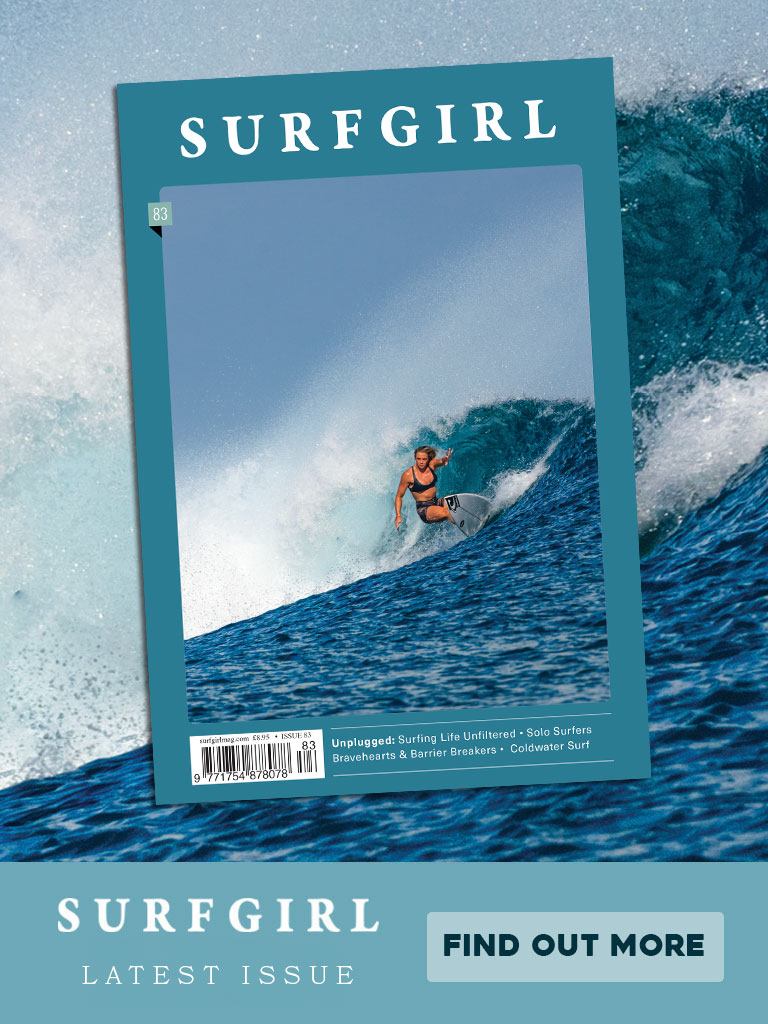
Sophie speaks about sexism in surfing and gets misrepresented big time.
Here’s Sophie’s original article:
I speak because I can.
I’m coming close to 30. Life has been full of lessons and my understanding of all things has changed and is constantly shifting. I play football on Thursdays and there are times now I don’t even realise I’m the only girl playing. I am snotty, red faced and sweaty with no make up on and my hair scraped back, but none of that matters. What matters is the quality of my pass. What matters is the deep feeling of belonging and the release of endorphins. When I play football and surf I’m in this state of flow and it’s like my brain is unconscious of what it’s doing. There is no mirror. Sport for me is a place of unselfconscious freedom and expression.
The hyper-sexualisation of women in surfing culture is an interesting conversation and it’s an issue men need to be talking about too. It’s especially interesting for me as I have been on both sides of the debate. I am full of contradictions. I have modelled in countless photo-shoots and I have shouted feminism from the rooftops. I don’t believe I have to stop riding a pink surfboard just because I believe in equal pay.
I’ve been commented on far too many times to remain indifferent. I support professional female surfers who are pushing for an end to the over sexualised surfing culture but it is a daunting thing to speak up about. I often have the feeling I am the single female voice, constantly in a room full of men, and it’s hard to be heard.
The first time I remember becoming aware of this sense of imbalance and objectification was when I was 14 and was told I couldn’t join the local surf club as I was a distraction for the boys. Why was their distraction and inability to focus my responsibility? Then 10 years later, a magazine article was written about me, by a man, that questioned my morals for a photo-shoot I did surfing for a deodorant company. He suggested I was a bad role model for young women and that surfing in a bikini did not help the progression of women in surfing. Nobody contacted me for a comment and the dialog was from his voice alone. Where was the female voice in this matter?
I hope I am not a bad role model. I hope that just maybe I might motivate someone to ask themselves the questions I am only just realising to ask myself. Do I want to help create a world where women are valued and equal and our differences celebrated? A world where all people strive to make the world, both environmentally and culturally, a better place?
I live near Lahinch, a village in the West of Ireland on the edge of the wild Atlantic. I surround myself with people that nourish me, including the other women who surf here. There are about 25 of us female surfers now, who live here and surf in these waters regularly throughout all the seasons. We are a team. My tribe of women; mothers, wives, warriors, doctors, physiotherapists, waitresses, counsellors and business owners. They are beautiful, smiling water women, a supportive community of non-competitive surfers, and it fills me with pride and happiness to see them in the ocean.
Despite all the surfing women in my community, I find it strange and frightening that we are often misrepresented, or more commonly, not represented at all in the films, photos and stories. The internet and film festivals are full with tales of what surfing is like on this beautiful island of Ireland and there is rarely a woman featured without her being a mother, wife or barmaid. But we are here, throughout every season, paddling out and riding waves. It is our story too.
So why are we female cold water surfers not being represented by so many surfing media outlets? Sport is supposed to set you free, not make you feel you have to be objectified to participate. I believe what we see, we can be. I speak to young girls who don’t see female surfers in the films about our coast and they question their place in the surfing world and whether they should be doing it at all.
We live in a male dominated world in which men are at the helm; male presidents, largely male governments, priests, captains, headmasters, police, even superheroes. I am not calling all men misogynists, you are not the patriarchy, I am just identifying the general problem; that most of the power and influence in the world are held by a small amount of men. And that the world isn’t that peaceful either. I’m not saying if the world were ran by women it would be better, just different. Albert Einstein said the definition of insanity is doing something over and over again and expecting a different result. Maybe some diversity is what we really need here. I am not alone in believing today’s challenges will not be solved by testosterone alone.
When I refer to feminism, I refer to a person who believes in the social, political and economic equality of the sexes. Feminism means women being equal to men, in all areas of life, including sport. As Cailtin Moran so rightly puts it, not burning all penises in a bonfire. Feminist means women now being able to vote and, you know, rape being illegal. I’m confused then that so few describe themselves as feminist. What part of liberation for women is not for you? The campaign for equal pay? Jeans? And brothers, feminism is on your side too. Did you know as a man, you are far less likely to get custody of your children? That is not equality.
I believe the world would be a safer place if there were more gender balance, and this filters all the way down to the surfing media. Imagine surf magazines ran by women and how different an image they might portray of female surfers would be as a result. I don’t want the male dominated surfing industry to decide on my dignity or to make recognition of our equal humanity difficult. This is why I really like my wetsuit. It keeps us all equal. It emphasizes neutrality.
I think the media needs diversity of thought and diversity of perspective. To achieve this diversity, the surf industry must invest in their female talent and nurture that talent from the grassroots community kids surf leagues right through the ranks. This needs to include support and representation of the women who surf cold waters too. I don’t want to criticise other women, they are my sisters, I would just like to see a fairer representation of the true female surfing culture. These women we see in the magazines are powerful, wholesome women who surf with grace and have an indescribable connection to the ocean, an achievement that they should and we all should be proud of. I personally just don’t want my bum floating inches from teenage boys faces in a busy line up, it feels a bit weird and creepy.
What I would really like to see is a real process of change, for the media to inspire young girls to participate in transformative activities. We are going to need men to rise up and stand by us for this to happen. This isn’t some exclusive club that only angry women can join. We need your support; include us in your films, your photographs and your magazines. Give female surfers an equal chance for their stories to be represented. If you are a consumer, become more conscious and vote with your wallet. Support media and publications that support and include all kinds of female surfers, not solely those with a tan and a bikini; include the cold-water female surfers battling strong winds and biting chilly water too. This industry can change from the outside even if we cannot change it from the inside, to overcome this unconscious bias and move away from this potentially damaging archetype of female surfers. My hope is that we can create role models out of today’s female surfers to make surfing culture more healthy and empowering, leaving the world a safer, more diverse and sustainable place.
(Published in Wavelength Magazine Spring 2017.)
A journalist cherry picked quotes from Sophie’s article which then appeared in the national media. Here’s what the press have been saying
Examples of articles:
The Daily Telegraph / The Times / The Times 2 / Daily Star / Devon Live
Understandably Sophie is extremely upset that her words have been misrepresented by the media. To address this here’s Sophie’s letter to the press:
To The Press,
Following my previous emails, please can you make the following amendments to your article on The Times immediately? If you can not make the amendments I request that you unpublish.
I feel you have a lot of misinformation here and that I have been quite exploited and misrepresented. I was not informed you would be writing an article about me, and I am very upset you have done so in this way. I was in the understanding the article was about the World Surfing Leagues new policy, not the following.
1. “Surf star Sophie Hellyer lets rip at bikini sexism” Not true. I was discussing the over sexualisation of female surfers, and the imbalance and objectification i have experienced. I think it its important we overcome this unconscious bias and move away from this potentially damaging archetype of female surfers, as it is unhealthy for everyone.
2. “Sophie Hellyer, a former English champion, said that surfing was “hyper-sexualised” and complained about a fall in media coverage since she had decided to stop wearing a bikini” Not true. I have not complained. Nor have I stopped wearing a bikini. I think there is a need for more diverse female role models to make surfing culture more healthy and empowering, leaving the world a safer, more diverse and sustainable place.
3. “Professional female surfer” Not true. I have never made a living out of surfing, I have always had another job. Please remove this.
4. “One of Britain’s top competitors” Not true. I haven’t competed for 10 years. If i were to compete in the British ranks now, I would definitely lose, and am not embarrassed to admit it. Please save this credit for the women who are surfing competitively and earning their titles. I do not want to take it away from them.
5. “Sophie Hellyer, 30, from Westward Ho!, in Devon, says she has suffered a drop in media coverage since she decided to stop wearing a bikini.” I questioned whether me getting less coverage now was related to the fact i surf in a wetsuit more often than a bikini, this was discussed to highlight the issue that you don’t often see women in full wetsuits in most mainstream media (that said, Surf Girl and many other female focused & indpenedent media do include this), not to highlight myself. My point unfortunately proven by the photos you have included in your article.
6. “She also accused some men in the surf world of being “incredibly disrespectful and unsupportive” What i actually said was “The majority of male surfers are lovely people but theres definitely the odd one here or there that are disrespectful and unsupportive.” Please do not twist my words.
7. “It does not mean I wear black and have hairy armpits.” As discussed – there is nothing wrong with wearing black or having hairy armpits, I often have both, it’s just not a compulsory part of believing in the social, political and economic equality of the sexes. Taken out of context.
8. “I personally don’t like surfing in bikinis; it’s impractical. They come down all the time, I get sunburn, wax rash, slip off from sun cream and always cut myself on the reef.” I also live in Ireland, where its obviously too cold for a bikini anyway. My quote that I referred you to was “I really like my wetsuit. It keeps us all equal. It emphasizes neutrality.” I still wear a bikini on holidays sometimes, but I often opt for leggings or a long sleeved rash guard to protect from the elements, and I also personally feel this is more respectful in Muslim countries like the Maldives.
I completely agree with what Steve England said, and I am concerned about what 12 year old girls (and BOYS) feel they have to be to enjoy surfing, and i think a more diverse and truer representation in the media of the world wide surfing community is one of the solutions.
I’m glad we have that cleared up and I look forward to hearing from you in the morning when you have made the amendments, or alternatively unpublished the articles.
Sophie










